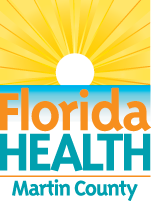It's a New Day in Public Health.
The Florida Department of Health works to protect, promote, and improve the health of all people in Florida through integrated state, county, and community efforts.
Post Storm Safety Following Hurricane Nicole
November 10, 2022
Now that Hurricane Nicole has passed through our area, the Florida Department of Health in Martin County (DOH-Martin) urges the community to use caution to prevent illness and injury.
CARBON MONOXIDE DANGERS
--Generator safety precautions can help prevent poisoning—
For any residents still without electricity, the Florida Department of Health is urging the public to avoid carbon monoxide (CO) exposure by taking precautions with gas-powered appliances such as generators and charcoal or gas grills.
Carbon monoxide is an invisible, odorless, tasteless gas, and is highly poisonous. Depending on the level of exposure, CO may cause fatigue, weakness, chest pains for those with heart disease, shortness of breath upon exertion, nausea, vomiting, headaches, confusion, lack of coordination, impaired vision, loss of consciousness, and in severe cases, death.
DOH recommends the following precautions to help prevent carbon monoxide poisoning:
- Do not burn charcoal or gas grills inside a house, garage, vehicle, tent or fireplace.
- NEVER use a generator indoors, including in homes, garages, basements, crawl spaces, and other enclosed or partially enclosed areas, even with ventilation. Opening doors and windows or using fans will not prevent CO build-up in the home.
- ALWAYS locate the unit outdoors, at least 20 feet away from your home or structure on a dry surface, away from doors, windows, vents, and air conditioning equipment that could allow CO to come indoors. Follow the instructions that come with your generator.
- Install battery-operated CO alarms or plug-in CO alarms with battery back-up in your home, according to the manufacturer’s installation instructions. The CO alarms should be certified to the requirements of the latest safety standards for CO alarms (UL 2034, IAS 6-96, or CSA 6.19.01)
- Test your CO alarms frequently and replace dead batteries.
- REMEMBER that you cannot see or smell CO and portable generators can produce high levels of CO very quickly.
- If you start to feel sick, dizzy, or weak while using a generator, get to fresh air RIGHT AWAY. DO NOT DELAY.
- If you have a poisoning emergency, call your nearest Florida Poison Information Center at 1-800-222-1222. If the victim has collapsed or is not breathing, call 911 immediately.
FLOOD WATERS
-Avoid contact with flood waters, especially if you have open cuts or sores-
- If you have any open cuts or sores and come in contact with flood waters, wash the area well with soap to prevent infection. If a wound develops redness, swelling or drainage, seek immediate medical attention.
- Residents who sustain lacerations and/or puncture wounds, are encouraged to contact their primary health care provider to make sure they are current on their tetanus vaccine and possibly get a booster.
- Basic hygiene is critical. Wash your hands with soap and either disinfected or boiled and cooled water, especially before preparing or eating food, after toilet use, after handling a soiled diaper, after participating in flood cleanup activities and after handling objects contaminated with flood water or sewage.
- Avoid eating or drinking anything that has been contaminated with flood waters
If on a septic system and your plumbing is functioning slowly:
- Conserve water as much as possible; the less water used the less sewage the septic tank must process. Minimize use of your washing machine.
- Do not have the septic tank pumped. Exceptionally high-water tables might crush a septic tank that was pumped dry. If the fundamental problem is high ground water, pumping the tank does nothing to solve that problem.
If your well is flooded:
- Heavy rainfall may have made your well water unsafe to drink. If you are unsure about the impact of flooding on your well water, use bottled water or boil water for drinking, making ice, teeth brushing and washing any areas of the skin that have be cut or injured.
- For tips on how to disinfect a well that has been flooded: CDC Well Disinfection
- For additional questions, contact DOH-Martin, Environmental Health: 772-221-4090




Connect with DOH